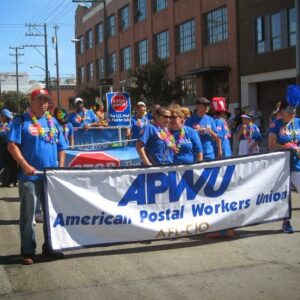May 1, 2015
What We’re Fighting For
(This article first appeared in the May-June 2015 issue of The American Postal Worker magazine.)
Sisters and Brothers,
I am proud that our activist union is engaged and organizing in many good battles, including to:
- Win a strong new contract;
- Stop the delay of America’s mail and keep plants open;
- Continue the fight against the Staples-USPS dirty privatization deal;
- Build the “Grand Alliance” of 73 national organizations united to save our public Postal Service;
- Expand the Campaign for Postal Banking;
- Work toward positive postal legislation, and
- Mobilize to stop the “fast tracking” of bad trade deals like the Trans-Pacific Partnership (TPP)!
Will We Get a Contract?
But what is likely foremost on our members’ minds are the ongoing efforts to win a good collective bargaining agreement (union contract) as our current agreement expires on May 20.
I have received many inquiries from around the country: Will we get a new contract?
The answer is yes! The APWU and the USPS will either achieve a negotiated settlement or, if not, we will enter the process of binding arbitration. Clearly our preference is to reach a voluntary agreement and not have an arbitrator (a third party) determine our destiny.
If the APWU negotiating committee succeeds in reaching a tentative agreement, the Rank and File Bargaining Advisory Committee will review it and decide whether to send it to the membership for a vote to accept or reject. You, the members, are – and should be – the ultimate decision-makers!
What We’re Fighting For
As I write this, we are six weeks into negotiations and it is a good time to share some perspective on the process, where we are now, where we hope to go, and how to get there.
The last contract contained huge concessions to postal management, with approximately $4 billion of givebacks in wages and benefits. There were two years with no pay raises and two skipped cost-of-living adjustments. A much lower “second-tier” pay scale was created for career employees; a large non-career work force was established with low wages and absent most benefits, and full-time work was redefined as 30 hours or more per week.
As I stated at the opening of contract negotiations: “We believe the deep concessions in the last contract … should be looked at as temporary solutions to temporary problems.” It is now up to us, the bargaining committee and the members, to refuse any further concessions. So our first goal is to stop the downward spiral, the race to the bottom.
Our second major goal is to turn the corner and begin to restore what was lost. We are striving to win an all-career work force. Short of achieving that goal, the APWU will work to uplift our non-career brother and sister postal workers. We plan to protect full-time work by addressing the problems with Non-Traditional Full-Time (NTFT) assignments.
We have an important fight to limit subcontracting and management’s plans to subcontract out the entire driving workforce and shift retail work to the non-union private sector (i.e. Staples).
We will be fighting for a strong economic package of wage increases and protection of benefits.
We are also advocating to expand and enhance public postal services, including into a broad field of financial services, which will benefit the people of the country.

proudly wear contract stickers.
Stages of Bargaining
Negotiations are currently in the early stage, meaning that both sides are presenting their proposals in “broad stroke.” These proposals lay out our goals and do not necessarily reflect where we will end up if we reach a negotiated agreement. The negotiating committee understands that and I imagine most of you do as well. Progress is the key, and progress we must have if we are to agree to any tentative agreement.
By the time you read this article, we expect to be in the next stage of negotiations, where the parties talk seriously about a potential “framework agreement” and try to put the pieces of the puzzle together. If we agree on a framework, we will begin the final, intense push to translate general agreements into specific contract language.
While there are definite areas of common ground and cooperation with the Postal Service, we reject management’s rhetoric during these negotiations suggesting that we are “strategic partners.” If there was such a “partnership,” there would be no closing of plants and excessing, reducing hours of post offices, slowing down the mail, efforts to eliminate six-day delivery, resistance to offering financial services, or demands for concessions at the bargaining table.
Management’s actions over the last few years make it crystal clear that it is them vs. us, and we should act accordingly.
Power, Leverage
Negotiations are about power and leverage. The USPS certainly has some leverage in these negotiations. But so do we.
There is a growing unity among the four postal unions. We are part of building “A Grand Alliance to Save Our Public Postal Service.” We are part of an active “Campaign for Postal Banking.” We are “in the streets” until we win the fight against the Staples subcontracting deal.
The public, including an overwhelming percentage of young people, support the public Postal Service. Absent the congressionally-manufactured pre-funding hoax, the Postal Service is enjoying strong financial performance in relation to its operations, with tremendous opportunities presented by the e-commerce revolution.
The APWU negotiating committee, officers, and union staff are battle-ready. And you, the members, active and retired alike, have stepped up with the contract campaign demanding “Good Postal Service! Good Jobs! Good Contract!”
And all over the country Contract Action Teams (CATs) are in motion rallying their co-workers and customers alike.
So, keep up the heat! Wear the stickers! Help educate the public! Talk to your co-workers, family, neighbors and friends. Be involved, for each of us has an important role to play in winning a contract that justly rewards us for our dedication and invaluable work.
Carry on!


